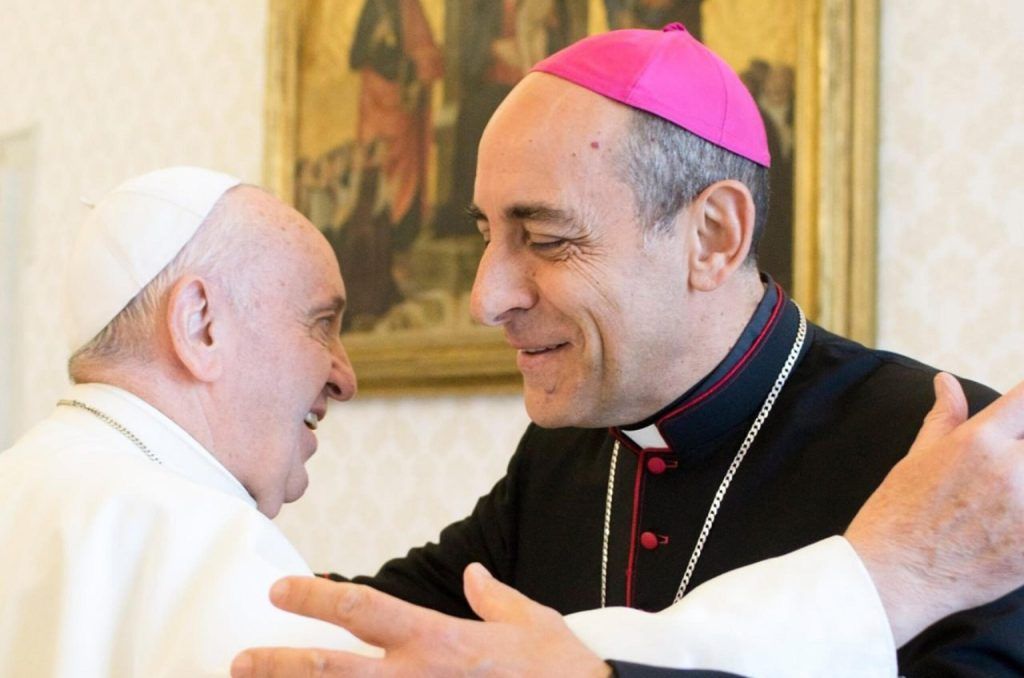Yesterday, Cardinal Víctor Manuel Fernández, prefect for the Dicastery for the Doctrine of the Faith, published a Declaration, with the signed approval of Pope Francis, entitled Fiducia Supplicans, “On the Pastoral Meaning of Blessings.” This Declaration articulated the importance of blessings in Biblical, historical, and ecclesial perspectives.
The Declaration states that it “remains firm on the traditional doctrine of the Church about marriage, not allowing any type of liturgical rite or blessing similar to a liturgical rite that can create confusion. The value of this document, however, is that it offers a specific and innovative contribution to the pastoral meaning of blessings, permitting a broadening and enrichment of the classical understanding of blessings, which is closely linked to a liturgical perspective.”
So, the Declaration wants to uphold the doctrinal integrity of the blessing given within the sacrament of marriage, while simultaneously wanting to allow a blessing that is “linked to,” but not similar to, a liturgical blessing given in marriage, thus, not causing confusion between the two. The Declaration boasts that this provision “implies a real development” that is in keeping with Pope Francis’s “pastoral vision.”
It continues: “It is precisely in this context that one can understand the possibility of blessing couples in irregular situations and same-sex couples without officially validating their status or changing in any way the Church’s perennial teaching on marriage.” Here, one perceives the real reason for which this Declaration was written – to bless “couples in irregular” marriages and to bless “same-sex couples.”
The Declaration elaborates on these two situations. Within this pastoral vision “there appears the possibility of blessings for couples in irregular situations and for couples of the same sex, the form of which should not be fixed ritually by ecclesial authorities to avoid producing confusion with the blessing proper to the Sacrament of Marriage.”
Nonetheless, although these blessing “do not claim a legitimation of their status,” they “do beg that all that is true, good, humanly valid in their lives and their relationships be enriched, healed, and elevated by the presence of the Holy Spirit.” The Declaration sees such blessings in accord with what’s been traditionally called “actual grace. ” The purpose of this grace is “so that human relationships may mature and grow in fidelity to the Gospel, that they may be freed from their imperfections and frailties, and that they may express themselves in the ever-increasing dimension of divine love.”
In all the above, there is the appearance of reason, but also a great deal of jargon, sophistry, and deceit.
First, the Declaration professes that what is being offered is a development of doctrine in keeping with Pope Francis’s “pastoral vision.” In Essay on the Development of Doctrine, St. John Henry Newman provides criteria for judging what is true and what is erroneous doctrinal development (a “corruption”). Ultimately, he concludes, it’s the infallibility of the Church that validates authentic development.

Newman puts forward, however, a hypothetical, though frightening, hypothesis. What if a council or a pope were to teach a doctrine that would contradict a previous council or pope? Newman declares that it would shatter the notion of doctrinal development, for who then would be able to judge what is authentically revealed and what is not?
Newman’s alarming hypothesis is not so hypothetical today. Despite its claims to the contrary, the Declaration blatantly contradicts the perennial magisterial teaching of the Church concerning irregular marriages and the sexual activity of same-sex couples. Must one conclude, with Newman, that such teaching eradicates the very notion of doctrinal development and ultimately the very notion of doctrinal truth itself?
Here I would offer a thesis that Newman did not consider – one that I believe is important within our present ecclesial context. Newman presumed that all pontifical teaching or teaching from bishops concerning doctrine and morals is magisterial. I propose that any pontifical teaching or teaching from bishops that overtly and deliberately contradicts the perennial teaching of previous councils and pontiffs is not magisterial teaching, precisely because it does not accord with past magisterial doctrinal teaching.
The pope or a bishop may be, by virtue of his office, a member of the magisterium, but his teaching, if it contradicts the received previous magisterial teaching, is not magisterial. Such false teaching simply fails to meet the necessary criteria. It possesses no ecclesial authoritative credentials. Rather, it is simply an ambiguous or flawed statement that attempts or pretends to be magisterial, when it’s not.
Second, to bless couples in irregular marriages or same-sex couples without giving the impression that the Church is not validating their sexual activity is a charade. All those present at such blessings know, without a doubt, that such relationships are sexual in nature. No one is fooled. Actually, they are rejoicing that such sexual relations are being blessed. That’s the point of these blessings. It is not their sexual abstinence being blessed, but their sexual indulgence.
Third, while couples in irregular marriages and same-sex couples can be blessed, what cannot be blessed, and so validated, is the sin in which they are engaged. It is impossible to bless an immoral act, and to attempt to do so is blasphemy, for one is asking the all-holy God to do something that is contrary to his nature – the sanctioning of sin.
Moreover, to bless irregular marriages and same-sex couples, for the purposes of authenticating their sexual activity, is an affront to and a demeaning of the sacrament of marriage itself. Such blessings undermine the dignity of marriage – a sacramental sign of the indissoluble union between Christ and his Church.
Although “On the Pastoral Meaning of Blessings” may be well intended, it wreaks havoc on the very nature of blessings. Blessings are the Spirit-filled graces that the Father bestows upon his adopted children who abide in his Son, Jesus Christ, as well as upon those whom he desires to be so. Attempting immorally to exploit God’s blessings makes a mockery of his divine goodness and love.















